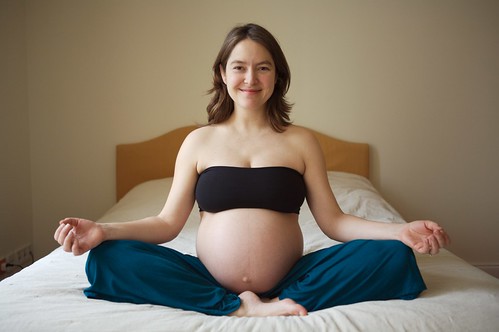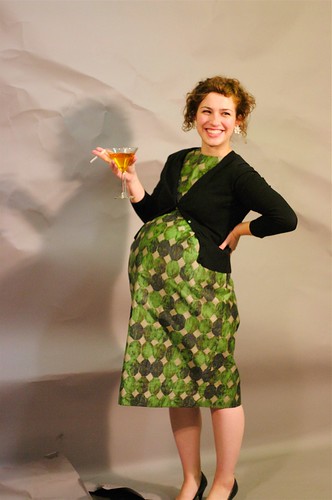Several news outlets--including
CNN,
NPR, and
TIME--are reporting on the recent rise in home births in the U.S. And they've got something significant to report: home births are up nearly 30% since 2004.
These findings, of course, have fueled the ongoing divide between home and hospital births, which (almost always, in my experience) quickly falls into a debate between medicated and non-medicated births.
These divides make some sense. Obviously, many of the medical options that come standard in a hospital (like pain medication) aren't going to be available during a home birth.
Home birth advocates stress the importance of a woman's autonomy during the birthing experience and criticize the medicalized view of birth in the U.S. as limiting and restrictive to women. My
own birth experience (non-medicated in a hospital), while ultimately positive (I got a healthy baby girl, and I didn't have meds), was frustrating because of the limits that were placed on me and the way I was treated as if control over my body wasn't mine to take.
Hospital birth advocates claim that the risks of home births are too high, and that women who wish to birth at home are selfishly putting their own unrealistic expectations before the safety of their children.
Both of these views are reflected in this quote from the TIME article:
A study published in 2010 in the American Journal of Obstetrics & Gynecology found that planned home births involved less medical intervention — fewer epidurals, episiotomies and infections and less emphasis on electronic fetal heart rate monitoring — but they were associated with three times the number of infant deaths. “Keep in mind that the absolute risk is still incredibly low,” says Macones. “But obstetrics is a risky business sometimes.”
These results have been disputed, with some saying there were
design flaws in the study's meta-analysis approach.
Studies have also shown that increased risks disappear for low-risk, second (or more) pregnancies.
While there is plenty to unpack from this argument, I want to focus on the way that these studies and arguments get dichotomized and how that dichotomization hurts women who may not have some of the privileges of those driving the discussion.
Some
recent posts on Feministing
featured famed midwife Ina May Gaskin. The comments on these posts demonstrated the way that the home birth/hospital birth debate can become ugly in a hurry--and this is among a community of women who self-identify as feminists (and thus pro-woman). Even though many of these comments were respectful and well-stated, they still display the dichotomy in progress. Many of the women on this thread expressed that the home birth movement made them and their ideals feel attacked:
"I do have a problem with some of the home-birth movement’s sense of ideological purity, which sometimes goes so far as to shame women who choose to give birth in hospitals and who choose to have modern pain mitigation." -L. K. Lowe
"Can we please not confound feminism with the naturalistic fallacy? Just because birth is “natural” doesn’t mean it’s safe or de facto good. Kidney stones are natural, I don’t see people feeling they are somehow morally superior for passing those at home without medication or medical supervision." -Petra
I don't want to belittle L. K. Lowe's point that women feel judged for having a hospital birth--in fact, her point is kind of my point, too. However, women also feel judged for having home births. Take a look at this
blog post that belittles women's attempts to have control in their births:
Home birth as a way to find a loving supportive environment and fight the enslavement of the patriarchy is absolute, utter nonsense. It’s one of the only medical scenarios I can think of where women place health and welfare in jeopardy in order to feel “in control” and avoid intervention.
And, of course, there's Amy Tuteur whose entire
raison d'être is to demonize women who choose births outside of hospitals, demonstrated most clearly on
her blog, but also--inevitably--in the comments of nearly every single major article on the subject (including the Feministing ones).
I fully support a woman's decision to have a home birth. I was very frustrated by my hospital experience and felt that I was not respected or treated with compassion. I hated the way the medical community made me doubt my own body, and I hated how much I had to fight just to give birth to my child. I completely sympathize with someone who doesn't want to have that battle and sees avoiding the battleground as the easiest way to do it. I also completely respect people who simply think that their homes are the best environment for birth. I think that women should be allowed to make sound judgments about their own birthing experiences, weigh any risks for themselves, and be informed advocates for their actions. However, I think that the way this conversation gets framed is damaging all of us, and some of us more than others.
When we turn birth experiences into an either-or dichotomy, we miss the opportunity to join our voices and advocate for changes in medical policies and research. That hurts all of us, but it especially hurts women who may lack the socio-economic privileges that the women at the forefront of these arguments are granted.
Looking at the planned home birth statistics, it is clear that most of that 30% increase can be attributed to a narrow demographic: educated, well-off, older, white women.
The NPR article explains that
"The increase in home births isn't occurring among all women. The trend appears to be being driven primarily by older white women, according to the report. Home births increased 36 percent among white women between 2004 and 2009."
Other statistics back up this trend. [Edit: I re-worded this section for clarity and added the comparative percentages for hospital births] One study looked at home births (link requires subscription access) across 19 states in 2006. The study aimed to compare the demographics of planned home births, unplanned home births, and hospital births.
- 90.1% of planned home births were to white women, compared to 5.6% for Hispanic women and 2.2% for African American women (by comparison, the percentages for hospital births were 49.7% white, 32.2% Hispanic, and 11.9% African American)
- 91.7% of planned home births were to married women (compared to 61% of women birthing in hospitals)
- 54.9% of planned home births were to women with 13+ years of education (compared to 48.8% of women birthing in hospitals)
It's important to also understand that many of the risks associated with home births are particularly true for unplanned home births. The same study has the following statistics on these kind of births:
- For unplanned home births 44.5% of the mothers were white, 25.4% were Hispanic, and 24.1% were African American (note that women of color have disproportionately high unplanned home births compared to the percentages for planned home births and hospital births)
- Only 36.2% of unplanned home births occurred in women with 13+ years of education
- Only 46.2% of unplanned home births occurred in married women
A similar profile of births in Utah (a state not recorded in the previous study) had the following results about planned home births [Edit: I also added the comparative stats for all births to this section]: - 90.9% of planned home births were to married women (83.3% of women were married in all births recorded)
- 41.8% of planned home births were to women with post-high school education (compared to 37.9% of all births recorded) and 40.9% were to high school graduates (compared to 45.2% of all births recorded) (so about the same percentage of 13+ year education across the board in Utah)
What do these results tell us? They tell us that the women who are likely to choose home birth are more likely to be highly educated, married, and white. In other words, the women who choose home birth are the ones who benefit the most from privilege in our society. To me, this means that these are the women who have the greatest access to information and the greatest ability to go against societal standards for birth through informed self-advocacy. They are also the ones who are likely able to afford the services of a midwife or doula if their insurance doesn't cover it (and they're the ones more likely to have insurance to begin with).
But what about women who do not have these privileges. What about women of color? What about women without a high school degree? What about women who are not married and may not enjoy the benefits of a two-income household? What about women who never even know that they have options on how they give birth?
To be clear, I'm not trying to say that women of color or unmarried women are incompetent and incapable of getting information about their birthing options, as I know many are. I'm just pointing out that privilege makes a difference, and when the privileged people in society (as they so often are) are the ones in charge of the narrative, those who don't benefit from privilege often suffer.
In this case, they suffer because the dichotomy keeps us from enacting real policy changes in our birthing culture. Maybe many women don't feel comfortable with a home birth for whatever reason (it's outside of their cultural norms, they can't afford a doula, they don't have a home suitable for birthing, they don't have a supportive partner to help with the birth and recovery, they prefer a hospital out of safety concerns, etc.) These women still deserve to have options and autonomy in their birthing choices, and when we turn the debate into HOME="NATURAL" HOSPITAL=MEDICATED and then focus all our energy on deciding who is "right" in that debate, we lose sight of (in my opinion) the real goal: getting ALL women, regardless of their socioeconomic status and regardless of where they give birth, autonomy over their bodies, access to information, and the right to birth without fear and coercion.











